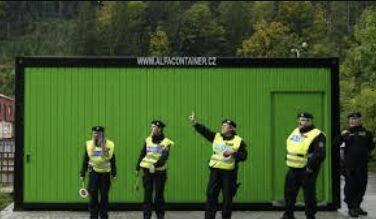Czech Republic, Poland, and Austria Heighten Border Controls to Tackle Illegal Migration and Smuggling
The Czech Republic, Poland, and Austria have implemented border checks along their borders with Slovakia to combat illegal migration and smuggling. These measures have caused political and trade friction among the countries but are necessary to combat unauthorized migration and smuggling. Slovakia has expressed dissatisfaction and called for a collective European solution to address the issue. The Czech Republic and Poland have taken these actions in light of recent elections, while Austria has followed suit to prevent spillover effects. The number of detained illegal migrants in Slovakia has surged, prompting the deployment of soldiers to assist with border patrols.
In a joint effort to combat illegal migration and smuggling activities, the Czech Republic and Poland have implemented border checks along their borders with Slovakia, with Austria following suit. These controls, which have upset Slovakia, will be in place for at least 10 days. Illegal migration has been a contentious issue in central Europe, and countries like the Czech Republic, Hungary, Poland, and Slovakia have been unified in opposing EU migration plans, such as quotas. However, the reintroduction of border controls during times of increased migrant flows has caused political and trade friction among these countries.
The issue of illegal migration also played a significant role in recent elections in Slovakia and upcoming elections in Poland. As a result, the ruling parties in both countries have focused on addressing this issue to secure public support. According to Czech Interior Minister Vit Rakusan, these border checks are necessary to effectively combat smugglers and illegal migration. The checks will be randomly conducted throughout the entire border, with the aim of minimizing disruptions to cross-border traffic. Following the actions taken by the Czech Republic and Poland, Austria has also implemented similar border controls with Slovakia to prevent any spillover effects.
The Slovak government has expressed its dissatisfaction with these measures and believes that the issue of illegal migration needs a collective European solution. Slovakia has experienced an increase in illegal migrants crossing its borders, primarily young men from the Middle East and Afghanistan who use the Balkan route through Hungary from Serbia. Former Slovak Prime Minister Robert Fico, who took a strong stance on illegal migration before the recent elections, has indicated that protecting the border with Hungary will be a priority for his party, which won the elections and is currently trying to form a government.
While Slovakia acknowledges the challenges of fully sealing its 655km border with Hungary, it has deployed up to 500 soldiers to assist with border patrols. The number of detained illegal migrants in Slovakia has surged nine-fold this year, reaching over 27,000. Slovak caretaker Prime Minister Ludovit Odor has criticized the unilateral actions taken by neighboring countries, emphasizing the cascading effect they create. He asserts that Poland initiated this process due to its pre-election period, followed by the Czech Republic.
Poland, which has its own election on October 15, has made illegal migration a central campaign issue, utilizing advertisements highlighting the threat it poses. Polish Interior Minister Mariusz Kaminski has reported a significant increase in illegal migration, with 551 individuals being detected and detained at the border with Slovakia in recent weeks. This situation has prompted Poland to take decisive action. As the issue of illegal migration continues to affect the region, the Czech Republic, Poland, and Austria's coordinated efforts to strengthen border controls aim to address the challenges posed by unauthorized migration and smuggling activities.




